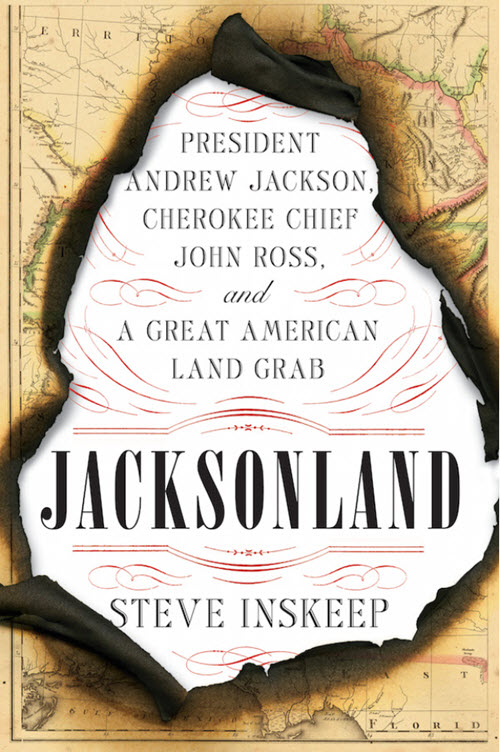Jordan Wright
July 15, 2015
Special to Indian Country Today Media Network

Morning Edition co-host Steve Inskeep’s book Jacksonland: President Andrew Jackson, Cherokee Chief John Ross, and a Great American Land Grab tells the almost-lost-to-history story of Cherokee Chief John Ross and his attempts to save the Cherokee Nation from President Andrew Jackson. Photo credit: Penguin Press
You don’t need to be a history buff to dive headlong into Jacksonland: President Andrew Jackson, Cherokee Chief John Ross, and a Great American Land Grab (Penguin Press, 2015), Steve Inskeep’s riveting masterpiece of two influential men who held radically opposing visions for our country. The well-respected author and co-host of National Public Radio’s Morning Edition recounts in vivid detail the ultimate story of power, ego and greed that was played out in the Deep South (which Inskeep dubs Jacksonland) and which ultimately defined the future settlement of our nascent nation. Coming from relatively humble roots, both men once fought on the same side and later crossed verbal swords in defense of their principles—Jackson, whose desire for personal gain for both himself and his well-heeled cronies translated into immense power and control of the Union, and John Ross, a well-educated and savvy Cherokee Indian chief committed to protecting Indian territories and sovereign rights.
Inskeep toggles between chapters about Jackson and Ross as he methodically lays out their personal journeys, meticulously detailing their early lives, crossed paths, and the events and battles that lead to the ultimate betrayal—the Trail of Tears. But the events do not progress in a straight line. And that’s precisely what makes this a page-turner.
At stake in 1812 were the territories of the Five Civilized Tribes—Cherokee, Seminole, Chickasaw, Choctaw and Creek—whose collective territory extended from the southernmost tip of Florida, around the panhandle to Louisiana and the Gulf of Mexico to the south, westward along the muddy banks of the Mississippi River to the Missouri Territory, and north in a winding border that extended from the Atlantic Coast south of what is known today as Georgia and along the northern reaches of the Tennessee River. This was the so-called Indian Map. On the contrary, the “White Man’s Map” of the same period laid claim to everything east of the Ohio River and the Mississippi, with the exception of Florida, which was still in Spanish hands.
Known to his people by his Cherokee name, Kooweskoowe, Ross was able to access the “whiteside,” as he called it, using his mixed Scottish and Indian ancestry to straddle both Indian and white political and social spheres. Trained as a lawyer, he sported the sartorial style of white politicians, cutting an imposing figure as he strode through the halls of Congress, negotiating with lawmakers to strike deals favorable to his people. There was no more dedicated and effective representative for the Cherokee, and they trusted and relied on his savvy statesmanship.
But the dark side to this era of Indian relationships with the U. S. government is the backstory of Jackson’s unimaginable greed, ruthless double-dealing and consolidation of power. How he granted favors to and colluded with his associates to obtain land for their personal enrichment, while breaking promises to the Indian nations.
Through personal letters written by Ross and Jackson, and a wealth of documents of the period, Inskeep has achieved an exhilarating read. Outlining the real history of Jackson’s rise to the U.S. presidency, and Ross’s hard-fought efforts for the Cherokee, the author makes it clear that given a few different conditions, the removal of the tribes might never have happened. For example it is stunning to learn that the 1835 Treaty of New Echota, in which the Indians ceded territory and agreed to move west, prevailed by a single vote, even though it had never been signed by Chief Ross or the Cherokee National Council. And that Jackson’s biggest battle may have been his health, which was so poor that frequently he was perilously close to death.
As a seasoned reporter, Inskeep has said he was driven by “the disgraceful politics of the past few years” to write this book. That passion has driven him to give us a clear-eyed and fascinating story of two influential men, one whose democratic values followed the principle of majority rule, and another who represented minority rights. But he has also delivered a cautionary tale of the machinations of the rich and powerful that especially resonates today.
Read more at http://indiancountrytodaymedianetwork.com/2015/07/15/jacksonland-riveting-narrative-details-chief-john-rosss-attempts-save-cherokee-nation